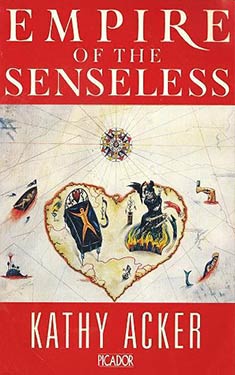Kathy Acker
Completed 3/23/2016, reviewed 3/24/2016
2 stars
I never had a class in postmodern literature, so my ability
to understand it has been hit or miss.
“Empire of the Senseless” is a miss.
It’s sort of a novel about a post-apocalyptic Paris narrated by Thivai
and Abhor, a pirate and a half- robot.
But it isn’t really a novel. It’s
a dark, transgressive, deconstructed look at society told in something akin to
stream of consciousness narration, made to shock rather than entertain. It’s a very hard book to read. I found myself trying to simply take in the
words and sentences as images and not worry myself with the nearly non-existent
plot. In the end, I didn’t get it.
 Kathy Acker was big in the underground art scene of New York
in the 60s and 70s. She was a
playwright, novelist, essayist, and punk poet.
Some of her works are semi-autobiographical, drawing on experiences
ranging from the suicide of her mother to a brief stint as a stripper. She taught classes at universities and she is
taught in post-modernism English classes.
Her point is to traumatize the reader into thinking about society,
politics, money, language, and sexuality.
In reading the reviews of this book, I find that what some people hate
about the book is what others find brilliant.
Kathy Acker was big in the underground art scene of New York
in the 60s and 70s. She was a
playwright, novelist, essayist, and punk poet.
Some of her works are semi-autobiographical, drawing on experiences
ranging from the suicide of her mother to a brief stint as a stripper. She taught classes at universities and she is
taught in post-modernism English classes.
Her point is to traumatize the reader into thinking about society,
politics, money, language, and sexuality.
In reading the reviews of this book, I find that what some people hate
about the book is what others find brilliant.
The plot of course is thin.
Thivai and Abhor narrate the book.
They are sometimes lovers, sometimes not, who traverse Paris after it is
overthrown by a revolution by Algerians.
The story is told with lots of references to sex, death, suicide, and
scatology. It had the most impact for me
when the characters tell the stories of their dysfunctional childhoods. The language is bizarre, it’s hard to tell
what’s real and what’s hyperbole. The
style ranges from non-sequitor to alliteration.
And there’s a lot of profanity.
Again, the point is to not make for a pleasant read, but to force the
reader to think about life from different perspectives.
Unfortunately, I didn’t find the experience to be as
profound as it’s supposed to be. As a
wordsmith, I thought Acker was quite lacking.
At times I thought that this is the kind of book John Waters could have
written if he tried to be serious and wanted to emulate Jean Genet. Most of the time, I thought that Waters was
the better literary wizard.
I know that there are many people who would disagree with
me, as is evidenced by the glowing reviews that are out there. There are also many people who would say I
went too light in my review. But I can
appreciate the author’s intent. That’s
the one part of post-modernism I do understand.
What I don’t get is the execution.
I have yet to read Burroughs, Genet, and “Ulysses” so I don’t have
anything to compare (though I have seen a Genet play that I sort of got).
I give this book two stars out of five. I only recommend it for people who want a
literary experience or were English majors, and aren’t easily shocked. I’m glad I read it, mostly because it took me
out of my reading comfort zone. But I
still feel John Waters is my preferred master of shock.
No comments:
Post a Comment